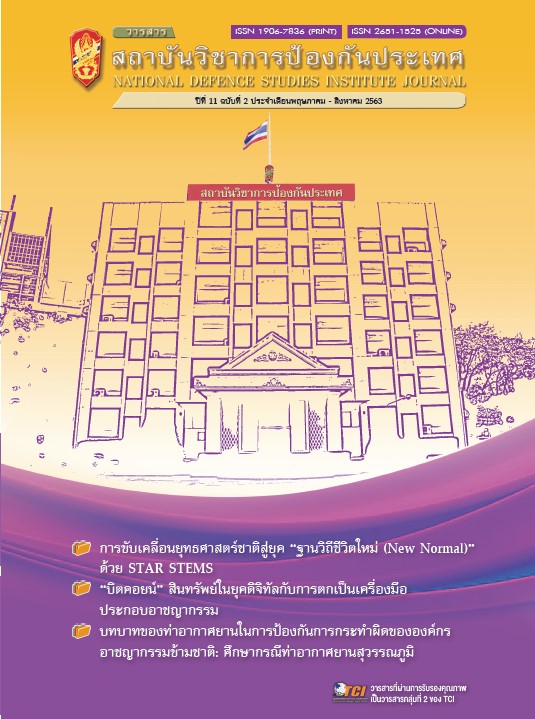Development of a Training Program Emphasizing Active Learning Based on Outcome-Based Learning to Promote Abilities in Designing Instruction Integrating the Principle of Sufficiency Economy Philosophy into Learning Strands
Main Article Content
Abstract
This study aims 1) to synthesize learning strands and learning outcomes being integrated with the core of sufficiency economy philosophy into societal development, 2) to develop the active-learning and outcome-based-learning training program to promote instructional-design abilities integrating the Sufficiency Economy Philosophy, and 3) to study the effectiveness of the developed training program. The research uses the six concepts of research frameworks, namely 1) concepts of training program development, 2) concepts of designing instruction, 3) outcome-based learning concepts, 4) active learning concepts, 5) concepts about integrated instruction, and 6) concepts of Sufficiency Economy Philosophy. This research uses an integrated research methodology between the qualitative research method for collecting data and the action research method with eight samples from the Social Sciences for Development Program of the Chulachomklao Royal Military Academy using the research and development process.
The research findings show that the strands to be integrated into each course should consist of contents about 1) creating and using resources in a cost-effective and sustainable way, 2) sharing resources which takes into account their own well-being, society and the environment without disturbing any others, and 3) having the right to social situations and the environment. As a result of the developed training program, known as "SUS-TRAIN-ABLE" program, there are three main stages, namely Phase 1: creating knowledge and understanding about the principles of instructional design, principles of integration and Sufficiency Economy Philosophy, Phase 2: creating a learning process from implementation by using group processes, and Phase 3: concluding learning outcomes and presenting recommendations for development. It is also found that the instructional abilities of all nine cases have been improved as compared with their performances before and during training program.
Article Details
The articles, images, tables, graphs, written content, and opinions published in this journal are solely those of the authors and do not necessarily reflect the views or positions of the National Defence Studies Institute or its academic affiliates.
References
กรมยุทธการทหารบก. (2559). คำสั่งกองทัพบกที่ 35/2555 เรื่องนโยบายการศึกษาของกองทัพบก พ.ศ.2555-2559.
ทิศนา แขมมณี. (2558). ถอดรหัสปรัชญาของเศรษฐกิจพอเพียงสู่การสอนกระบวนการคิด (พิมพ์ครั้งที่ 2). กรุงเทพฯ:
สำนักพิมพ์แห่งจุฬาลงกรณ์มหาวิทยาลัย.
ปรียานุช พิบูลสราวุธ. (2557). การขับเคลื่อนปรัชญาของเศรษฐกิจพอเพียง ด้านการศึกษา (พ.ศ.2549-พ.ศ.2557)
(พิมพ์ครั้งที่ 2). กรุงเทพฯ: บริษัท ศูนย์การพิมพ์เพชรรุ่ง จำกัด.
พิมพันธ์ เดชะคุปต์. (2560). ทักษะ 7C ของครู 4.0. กรุงเทพฯ: โรงพิมพ์แห่งจุฬาลงกรณ์มหาวิทยาลัย
ไพโรจน์ คีรีรัตน์. (2557). การสอนหลักปรัชญาเศรษฐกิจพอเพียงในโรงเรียน. มหาวิทยาลัยสงขลานครินทร์.
ภาวิณี โสธายะเพ็ชร. (2560). เคล็ด (ไม่) ลับกับการฝึกอบรม. กรุงเทพฯ: บริษัท นัชชาวัตน์ จำกัด
วิทยาลัยแพทยศาสตร์พระมงกุฎเกล้า. (2560). นโยบายการศึกษาของกองทัพบก พ.ศ.2560-2564. สืบค้นเมื่อ
ธันวาคม 2560, จาก http://www.pcm.ac.th/druweb/sites/default/files/userall53/Education%
Policy2560-2564.pdf
สุวิทย์ เมษินทรีย์. (2560). แนวคิดเกี่ยวกับประเทศไทย 4.0. สืบค้นเมื่อ 20 ธันวาคม 2560, จาก http://planning2.
mju.ac.th/goverment/20111119104835_planning/Doc_25590823143652_358135.pdf
สำนักงานปลัดสำนักนายกรัฐมนตรี. (2557). แผนยุทธศาสตร์การบูรณาการการขับเคลื่อนการพัฒนาตามปรัชญาของ
เศรษฐกิจพอเพียง (พ.ศ. 2557-2560).


